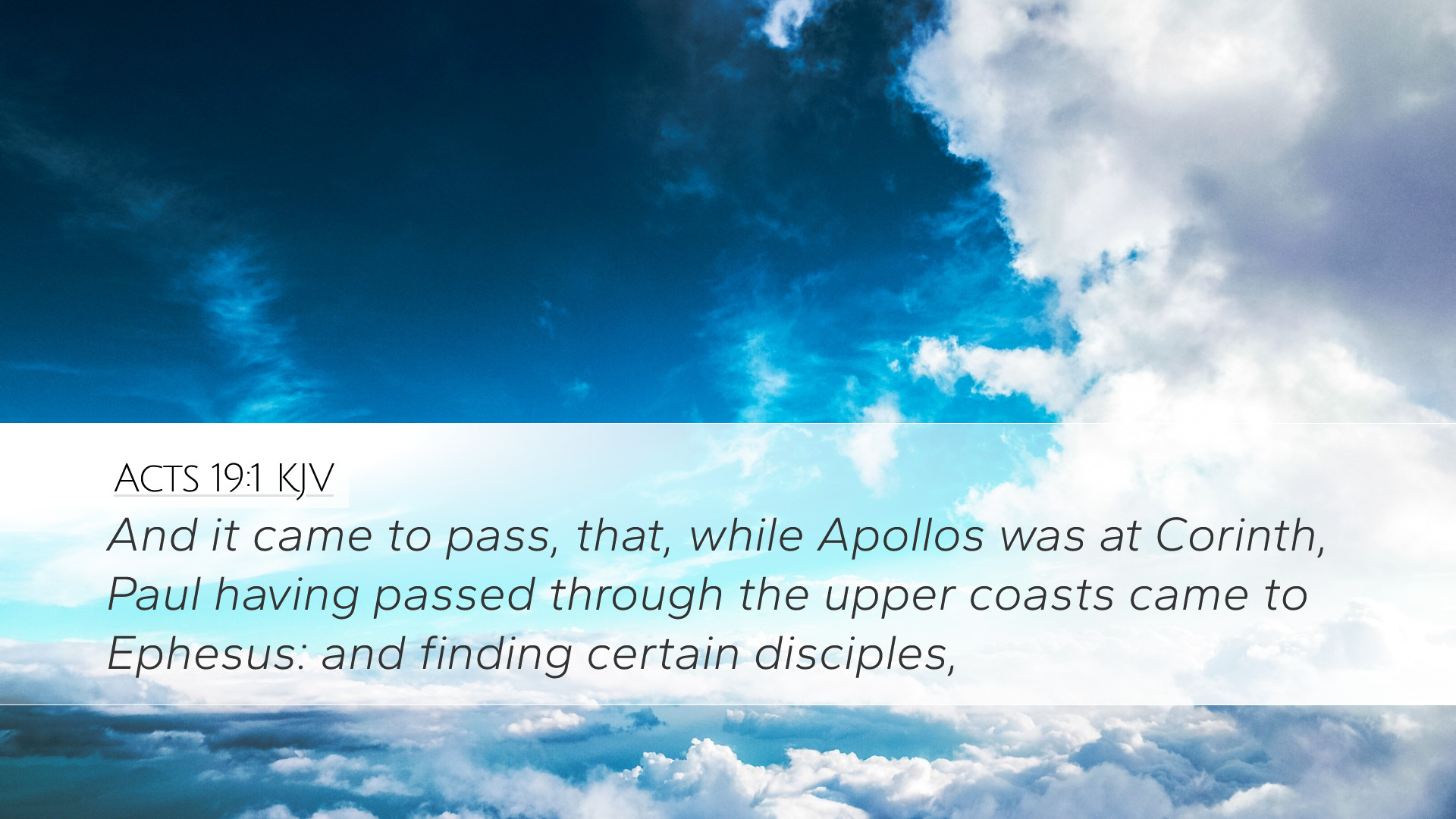Commentary on Acts 19:1
Acts 19:1 serves as a pivotal verse in the narrative of the Apostle Paul’s missionary journey, particularly his interactions in Ephesus. In this verse, we see the Apostle encountering disciples and initiating significant theological discussions that would shape the early Christian church. This commentary synthesizes insights from public domain sources, providing a rich exploration of the verse for pastors, students, theologians, and scholars.
Contextual Background
Before delving into the verse itself, it is important to consider the broader context within the book of Acts. Authored by Luke, Acts chronicles the growth of the early church following Christ's ascension, emphasizing the role of the Holy Spirit and the spreading of the Gospel. In Acts 19:1, Paul is in Ephesus, a significant cultural and religious center, where diverse beliefs and practices coexisted.
Verse Analysis
“And it came to pass, that, while Apollos was at Corinth, Paul having passed through the upper coasts came to Ephesus: and finding certain disciples,” (Acts 19:1, KJV). This opening phrase notes the chronological setting of Paul's journey between his encounters with other Apostolic figures. As Matthew Henry notes, this transitioning between locations underscores the continuous mission work of the early church.
Paul's Arrival in Ephesus
Paul’s arrival in Ephesus should be understood not merely as a geographical movement, but as a strategic step in fulfilling the Great Commission. Albert Barnes emphasizes that Paul sought to engage with the existing followers of Christ in the area, indicating the importance of community in the Christian faith. His encounter with “certain disciples” invites deeper exploration into the nature of these followers.
The Nature of the Disciples
The term “disciples” in this context raises questions about the understanding and teaching of these individuals. Adam Clarke posits that these disciples, while followers of Christ, may have had incomplete knowledge regarding the full expression of the Gospel. This provides an important reminder that discipleship is a journey of growth and deeper understanding.
Theological Insights
Several theological themes emerge from Acts 19:1:
- The Role of Apostolic Authority: Paul’s authoritative questioning marks the exercise of apostolic power in clarifying and instructing believers in their faith. His commitment to teaching emphasizes the importance of sound doctrine.
- The Necessity of the Holy Spirit: Often in the discussions that follow this verse, the significance of receiving the Holy Spirit is highlighted. This points to the transformative experience essential to the Christian faith.
- Every Believer’s Journey: The encounter between Paul and the disciples illustrates that the journey of faith is not uniform, and believers may come with different levels of understanding. This reality calls for patience and appropriate theological instruction.
Lessons for Today’s Church
The implications of this verse resonate deeply within the contemporary church context, urging leaders and congregants alike to reflect on their understanding of their faith.
- Engagement with New Believers: Just as Paul took the time to address the needs of the disciples, modern church leaders should be diligent in nurturing new believers, ensuring their foundational understanding of the faith is solid.
- Continuing Revelation: The relationship between knowledge and spirituality is critical. The disciples had faith but lacked complete understanding. This highlights the church's role in fostering environments where individuals can grow in grace and knowledge.
- Community and Discipleship: A communal approach resonates throughout Acts. The church today must focus on building a supportive community that emphasizes teaching, mentorship, and spiritual growth.
Conclusion
Acts 19:1 encapsulates pivotal moments not only in Paul’s missionary journey but also in the broader narrative of the early church’s mission to proclaim the Gospel. The verses that follow this encounter will explore the dialogue between Paul and the disciples, highlighting theologically rich themes of the Holy Spirit, the importance of teaching, and the growth of faith. For pastors, students, theologians, and scholarly readers, this verse serves as a reminder of our responsibility to foster a deeper understanding of the Christian faith within our communities, continually seeking the fullness of spiritual truth.


